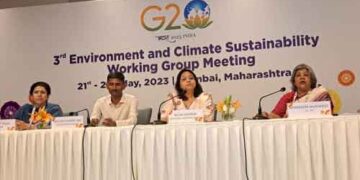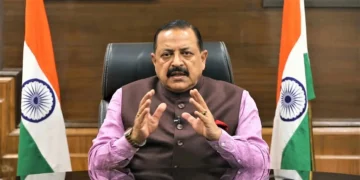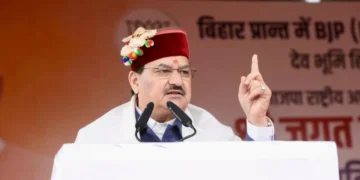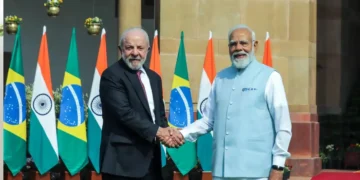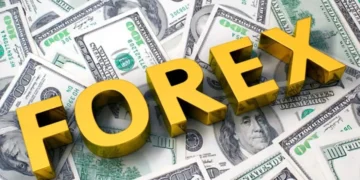 India along with other G20 countries will make a strong case for the developed countries to be compliant with the 1.5-degree-climate commitment and also to substantially contribute towards climate finance. Along with this contentious issue, the G20 3rd Environment and Climate Sustainability Working Group Meeting being held in Mumbai from May 21 and 23 will also discuss science, technology and innovation for a Blue Economy, policy, governance and participation and more importantly establishment of Blue Finance Mechanism. The Ministry of Environment, Forest and Climate Change (MOEFCC) additional secretary Richa Sharma on Saturday told the reporters that so far 139 G20 delegates, 14 international organisations including multilateral organisations and 10 guest countries deliberate on promotion of a sustainable and Climate resilient Blue Economy.
India along with other G20 countries will make a strong case for the developed countries to be compliant with the 1.5-degree-climate commitment and also to substantially contribute towards climate finance. Along with this contentious issue, the G20 3rd Environment and Climate Sustainability Working Group Meeting being held in Mumbai from May 21 and 23 will also discuss science, technology and innovation for a Blue Economy, policy, governance and participation and more importantly establishment of Blue Finance Mechanism. The Ministry of Environment, Forest and Climate Change (MOEFCC) additional secretary Richa Sharma on Saturday told the reporters that so far 139 G20 delegates, 14 international organisations including multilateral organisations and 10 guest countries deliberate on promotion of a sustainable and Climate resilient Blue Economy.
According to European Commission report released in 2017, emitters of carbon dioxide included China: 10.8 million metric tons, United States: 5.1 million metric tons, European Union: 3.5 million metric tons, India: 2.5 million metric tons, Russia: 1.8 million metric tons, Japan: 1.3 million metric tons, South Korea: 0.67 metric tons, Iran: 0.67 million metric tons, Saudi Arabia: 0.64 million metric tons and Canada: 0.61 million metric tons. According to the European Investment Bank (EIB) Group Forum, financing needed to meet adaptation and mitigation goals are estimated at trillions of US dollars annually until 2050. But so far, EIB estimates only around 630 billion dollars a year in climate finance across the whole world—with only a fraction going to developing countries.
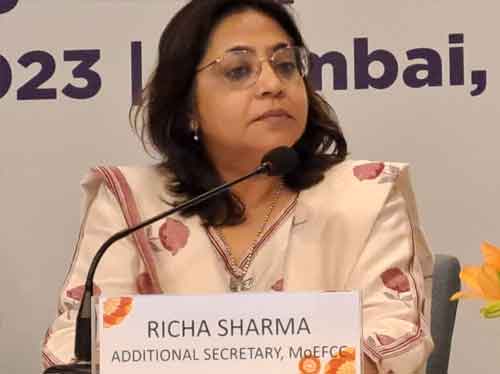
Sharma said that India has taken a lead to accelerate decarbonisation and has proposed to add 500 mw of installed capacity of non fossil sources by 2030.
‘’The main focus of the three day meeting will be on steering the discussions around Communique with a more outcome driven approach.The three-day event will commence with a side event on Beach Clean Up in Juhu, Mumbai, which would be followed by the side event, the Ocean 20 Dialogue. The beach clean-up is an initiative aimed at enhancing awareness and to sensitize citizens on the role of community participation in safeguarding our coasts and oceans. The Ocean 20 platform, launched during the Indonesia Presidency Dialogue, was aimed to advance ideation and action for ocean solutions. To ensure continuity and build on the initiative, the Indian Presidency is demonstrating active leadership by anchoring the Ocean 20 Dialogue in the 3rd ECSWG which will focus on three significant pillars of the Blue Economy. Both the side events are aimed at promoting a sustainable and climate resilient Blue Economy,’’ said Sharma.
Sharma said that almost in all countries the beach clean up initiative will be implemented on Sunday.
The sessions on the first Day of the meeting will cover various aspects of Blue Economy. The first session of the day will be on science, technology and innovation for a Blue Economy. The subsequent session will be on policy, governance and participation, with the concluding session on establishing blue finance mechanisms for Blue Economy. The sessions have been designed to have a panel discussion followed by engaging discussions with the audience. The deliberations will be aimed at working towards the well-being of the oceans and the need to make conscious efforts towards reversing damage to them and protecting our marine resources.
The next two days of the 3rd ECSWG will involve discussions on the draft Ministerial Communique with deliberations tuned towards achieving a consensus amongst the G20 countries. The closed-door sessions will conclude on a way forward note for the fourth ECSWG.
‘’The Environment and Climate Sustainability Group (ECSWG) under India’s G20 Presidency aims to enhance cooperation among the G20 nations to develop state of the art solutions for sustainable management of oceans and marine biodiversity conservation. The need for concerted global efforts and immediate action to address the current scenario has been consistently underscored in the meetings,’’ said Sharma.
